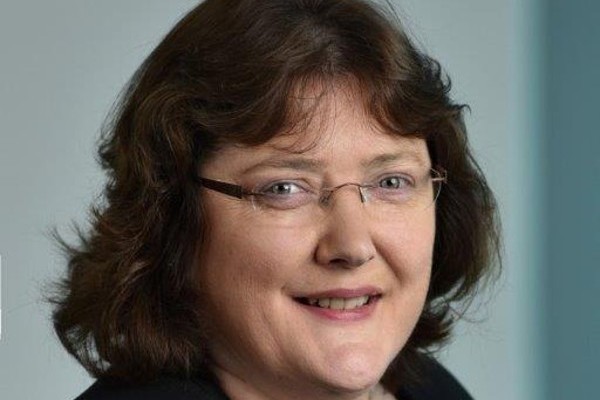
An excerpt from the Irish Times featuring Dr Ann Kelleher, published by Ciara O'Brien, 20th Oct 2023. Full story available here.
“I have one rule in life: help people as you go along. And when you need help, get it back.”
Cork’s Ann Kelleher is sharing the philosophy that has helped propel her to the senior ranks in global chip powerhouse Intel. Heading up the technology development division of the business, the Irishwoman has been credited with the turnaround of the unit by Intel chief executive Pat Gelsinger, where she was responsible for the research, development and deployment of next-generation silicon logic, packaging and test technologies.

We meet during a special visit to Intel in Co Kildare. The company has just opened Fab 34, a cutting-edge facility and one of the building blocks of the chipmaker’s future plans.
Kelleher is there to hand over the torch, so to speak, to the high-volume manufacturing group, marking the moment when the technology goes from being in development to being in production.
It marks yet another milestone in her career, which has been varied with Intel.
The small room in which we are sitting in Intel’s IR1 building holds some specific significance for Kelleher as it was the very room where she had her first job interview before joining the company.
“I did my interview in March 1996 in this room. They offered me the job and I thought I’ll go join for a couple of years, maybe three, four years, and then I’ll go back to research. And that’s 27, 28 years ago,” she recalls.
Back then, she was a process engineer. She had earlier worked with what is now known as the Tyndall Institute in Cork, leading a process integration group, and had a master’s, a PHD and a postdoctoral qualification under her belt.
“One of my jobs was to constantly do project writing so I could get funding for my group and afford to pay them and do the research,” she said. “As part of that, there was always a section: ‘what is your industrial experience?’. I didn’t have any, but I would tap dance around it to try to fill in the section. When Intel was starting its Fab 14 factory in Ireland, they asked me to come to interview.”
Kelleher has since held a number of senior roles at the global chip giant. After almost three decades with the company, many people would long ago have moved elsewhere in search of new challenges, but Kelleher has found plenty to keep her engaged at Intel.
“I had a fast-paced job. I had access to working on world-changing technology. I also got to move; I started as an engineer in Ireland and then I worked my way up to being factory manager here on site,” she says.
That kicked off a round of moves that has seen her build experience in various parts of the company and work her way through the ranks.
She was factory manager at Fab 24 in Ireland for around two years before applying for the plant manager role at Fab 12 in Arizona. That was followed by a stint in New Mexico before she moved on to head up Fab Sort manufacturing for Intel, a role that saw her assume responsibility for all aspects of the company’s high-volume silicon manufacturing that she held until 2015.
“Within that, I’ve done the supply chain side, the construction side, the quality side, I’ve done the manufacturing for both fab as well as assembly test,” she says.
That willingness to take on new challenges has paid off for the Cork woman. In the summer of 2020, in the midst of the Covid-19 pandemic, then-chief
Bob Swan asked Kelleher to take over technology development. She was later appointed executive vice president and general manager, technology development at Intel, the first time an Irish person had held such a senior role.
“In certain cases I took roles that other people didn’t take or wouldn’t because they felt they were very risky or very challenging. And in doing those I learned a lot because you learn a lot when you’re in a space where you have very challenging roles. I would say there’s a few of them here. We got a lot of help from people along the way,” she says.
That’s where her rule of helping people as you go has come from, and it has served her well. Almost three decades later, she is still excited about working for Intel, particularly at a time when the technology is advancing rapidly.
